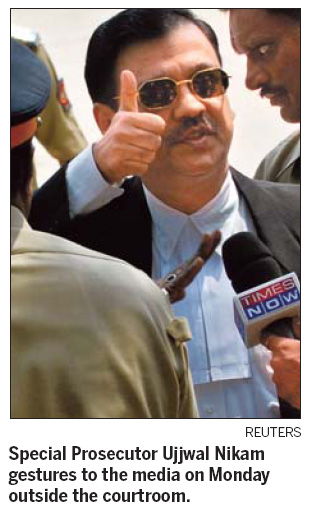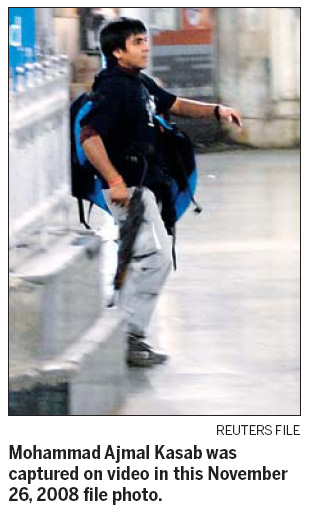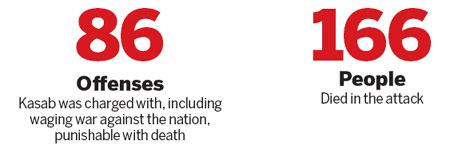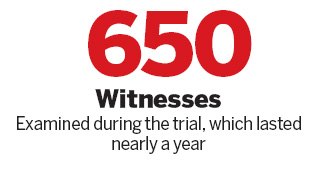Mumbai attacker convicted in India

MUMBAI, India - An Indian court Monday convicted a Pakistani man of murder and other charges for his role in gunning down dozens of people in the 2008 terror attacks that left 166 people dead in India's financial capital of Mumbai.
Mohammed Ajmal Kasab, the lone survivor of the attack's 10 gunmen, was accused in the siege's deadliest episode, when he and an accomplice killed 58 people and wounded 104 others at one of Mumbai's busiest train stations. Photos of Kasab striding through the station, an assault rifle in his hand, became iconic images of the attacks.
India had charged 38 people in connection with the Mumbai attack, most living in Pakistan.
Two Indian nationals, Fahim Ansari and Sabahuddin Ahmed, accused of being members of Pakistani militant group Lashkar-e-Taiba and conducting reconnaisance in Mumbai before the attack, were also on trial. Judge M.L. Tahiliyani also acquitted acquitted them.
Kasab sat impassively with his head bowed down as the verdicts were read. Sentencing in the trial has been set for Tuesday. Kasab, who was convicted of a range of charges, which also included waging war against India, faces a possible death sentence.
The badly decomposed bodies of the other nine suspected gunmen were buried in an undisclosed location in Mumbai in January by the police after Muslim clerics refused to let them be buried on their grounds.
India blames Lashkar-e-Taiba for masterminding the attack. In his verdict, the judge said Kasab was a member of the group.
The evidence against Kasab included footage from closed circuit cameras in and around the train station and the testimony of more than 600 witnesses.
The trial was conducted in four languages in a special court in Mumbai's high security Arthur Road Jail, where Kasab has been held since his arrest. He was arrested on the first night of the siege.
On Monday, security at the prison and the surrounding areas was exceptionally tight, with armed police and paramilitary troops on alert.
Despite its complexity, the trial has lasted only about a year - unusual speed for India's notoriously slow judicial system.
One of the memorable moments in the trial came in July, when Kasab made a surprise confession, admitting to committing the killings. He later retracted that statement, saying he had been tortured.
The attacks and subsequent investigation have added pressure to India and Pakistan's already tense relations.
Seven members of the LeT are on trial in Pakistan for their alleged role in the attacks and Islamabad has sought the extradition of Kasab and Ansari.
India has been pressing Pakistan to prosecute LeT founder Hafiz Mohammad Saeed, but Islamabad says New Delhi has not provided enough evidence against him.
India also seeks access to a Chicago man, David Headley, who pleaded guilty to helping plan the Mumbai attack. New Delhi wants to interrogate him and try him in an Indian court.
The United States has said it will allow Indian investigators to question him, but not extradite him.
Reuters contributed to this story.
Associated Press




(China Daily 05/04/2010 page12)














